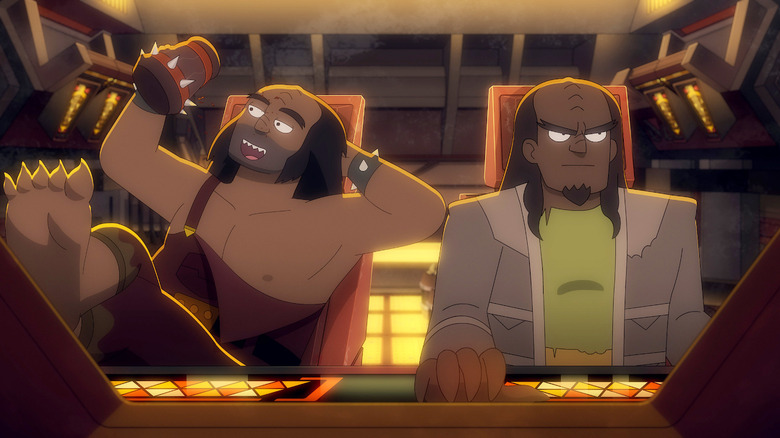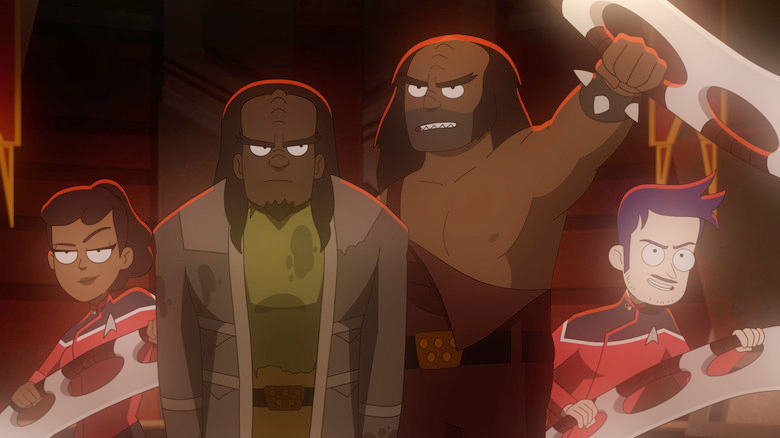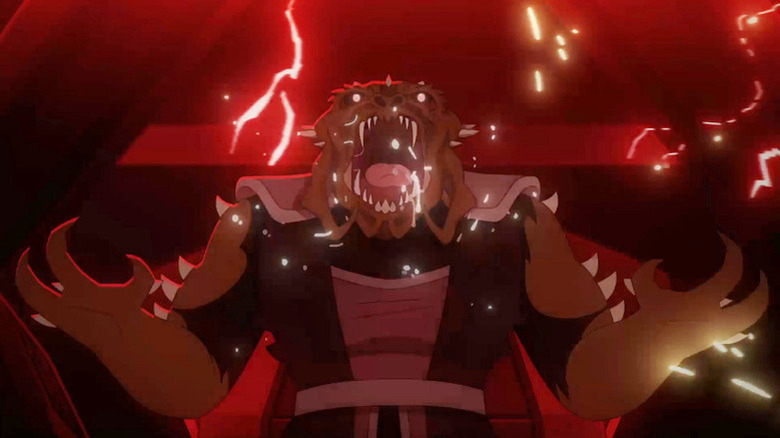The Star Trek: Lower Decks Finale Season 5 Confirms An Unexpected Piece Of Klingon Lore
Set phasers to spoilers, because this article discusses major plot details from the "Star Trek: Lower Decks" series finale.
The time has finally come for one of the best new additions to the "Star Trek" franchise (and one of the biggest pleasant surprises) to sail into the sunset, and the "Lower Decks" series finale certainly did right by all of its beloved characters. The fifth and final season as a whole feels like it couldn't have been planned any better, as it has gone out of its way to bring things full-circle with season 1, incorporated some headline-grabbing cameos, and even shined a light on its (actual) most underappreciated characters. But it just wouldn't be "Lower Decks" if the show's writers didn't throw in at least one last bit of canon-altering information on the way out the door.
To its credit, the animated series did so through the most "Lower Decks" approach possible. Remember when the fourth episode, titled "A Farewell to Farms," brought back the troublemaking Klingon brothers Malor (Sam Witwer) and Ma'ah (Jon Curry), the latter of whom was first introduced back during season 2? That format-breaking, Klingon-centric episode laid the groundwork for their return in the grand finale, as the pair plays an unexpectedly significant role in saving the multiverse from complete and total destruction alongside the USS Cerritos crewmembers. But during the climax, just as all hope seems lost, our heroes manage to come together one last time and wiggle out of harm's way by the skin of their teeth.
Amid the chaos, we also glean some shocking insight into the (admittedly) touchy subject of Klingon evolution — or should we say devolution?
The long, complex, and divisive history of Klingon evolution in Star Trek
Trekkies are known for their, er, extreme passion when it comes to the nerdiest details of franchise lore. Whether you're a total sucker for starship designs or simply can't get enough of the syntax and letters of entire fictional languages, there's something for every type of nerd in "Star Trek." One such subject has always revolved around the appearance of the Klingon race of aliens, who have since become famous for their pronounced forehead ridges, dark complexion, and long hair. Yet, it may surprise casuals to learn that this wasn't always the case. The "Star Trek" franchise stepped directly onto this landmine with "Discovery" and its controversial Klingon design bearing few of those hallmarks, which had to be reversed later on in "Strange New Worlds." Later shows steadily added their own complications over the decades, both to the delight and chagrin of fans everywhere.
We can now add "Lower Decks" to the list of series that have put their own distinct spin on the fan-favorite aliens.
The Cerritos' most dangerous mission yet puts them in harm's way of all sorts of multiverse shenanigans during the finale, as waves of tachyon radiation threatens to transform everyone (and everything) caught in its wake into endless alternatives from parallel dimensions. That means the Cerritos itself could suddenly become older or more futuristic models of the starship at a moment's notice ... which can mean life or death when traveling through such dangerous regions of space. That also applies to humanoids, however, as the marauding Klingons find out to their peril. Stripped of their shields thanks to some last-minute ingenuity, the renegades are exposed to the full brunt of the multiverse and suddenly transform into their most basic, primitive selves: proto-Klingons.
Lower Decks officially brings back proto-Klingons
Although a constant source of speculation among fans, these ancient versions that Malor dubs as proto-Klingons have rarely been seen before in the "Trek" canon. Full of rage (well, okay, more than they usually are) and far more animalistic in their brutality, the de-evolved beings turn on themselves and poetically spell their own doom. Considering all the discrepancies in appearance between their startlingly human-like design back in "The Original Series," their more familiar look in "The Next Generation" and "Deep Space Nine," and that debacle seen in "Discovery," Klingon evolution has always been a source of fierce debate in fandom circles. At the last possible moment, "Lower Decks" may have provided the "missing link" we've been looking for all along.
The idea of proto-Klingons has been alluded to in previous "Trek" installments (particularly in "Deep Space 9"), largely shedding light on mythological figures such as Kahless or the behavior of primitive Klingons who stunted their own development warring with one another in order to build their first empire. A season 7 episode of "The Next Generation" titled "Genesis," however, documents a medical experiment gone awry that inadvertently activates dormant genes among the Enterprise crew and reverts them to their most primitive forms. Worf turns into a proto-Klingon very reminiscent of the versions shown in "Lower Decks," several humans turn into reptile-like creatures, Lieutenant Barclay (Dwight Schultz) turns into a spider ... it was a whole big thing.
In "Lower Decks," we actually get to see what these Klingon variants looked like on their homeworld Qo'noS all those millennia ago. Sporting lizard-like eyes, facial appendages that sure give off the same vibes as the Yautja from the "Predator" franchise, and deadly spikes jutting out of their body along with razor-sharp teeth, this reinterpretation of the Klingon form might very well be the franchise's most radical one yet. In one fell swoop, the animated series added to what's sure to be an entire section of the "Trek"-centric wiki page — and reinforced an official part of Klingon lore forever.
You can catch every episode of "Star Trek: Lower Decks" on Paramount+.


